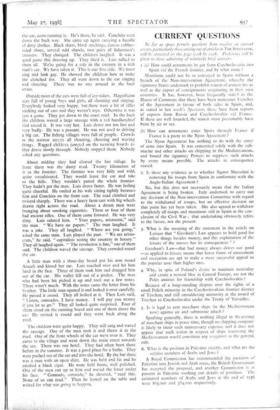CURRENT QUESTIONS
So far as space permits questions from readers on current events, particularly those arising out of articles in THE SPECTATOR, will be answered on this page week by week. Preference will he given to those admitting of relatively brief answers.
x (a) How could armaments be got from Czechoslovakia into Spain via the French frontier, and by what route?
Munitions could not be so conveyed to Spain without a breach of the Non-intervention Agreement, whereby the signatory States undertook to prohibit transit of armaments as well as the export of consignments originating in their own countries. It has, however, been frequently stated in the House of Commons that there have been numerous breaches of the Agreement in favour of both sides in Spain, and, as stated in last week's Spectator, there have been reports of exports from Russia and Czechoslovakia vid France. If these are well founded, the transit must presumably have been by air or sea.
(b) How can armaments enter Spain through France if France is a party to the Nyon Agreement ?
The Nyon Agreement has nothing to do with the entry of arms into Spain. It was concerned solely with the sub- marine and other attacks on shipping in the Mediterranean, and bound the signatory Powers to suppress such attacks by every means possible. The attacks in consequence ceased.
2. Is there any evidence as to whether Signor Mussolini is removing his troops from Spain in conformity with the Anglo-Italian Agreement ?
No, but this does not necessarily mean that the Italian Agreement is being broken. Italy undertook to carry out any decision of the Non-intervention Committee with regard to the withdrawal of troops, but no effective decision on that point has yet been taken. She also agreed to withdraw completely all troops and munitions still in Spain at the con- clusion of the Civil War; that undertaking obviously refers to the future, not the present.
3. What is the meaning of the statement in the article on Leisure that " Gresham's Law appears to hold good for other things besides money, and this exploitation of the leisure of the masses has its consequences " ?
Gresham's Law—that bad money always drives out good —as applied to leisure means that lower forms of amusement and recreation are apt to make a more successful appeal to the popular taste than higher ones.
4. Why, in spite of Poland's desire to maintain neutrality and create a neutral bloc in Central Europe, are not the Poles anxious for friendship with Czechoslovakia ? Because of a long-standing dispute over the rights of a small Polish minority in the Czechoslovakian frontier district of Teschen, and still smouldering animosity at the award of Teschen to Czechoslovakia under the Treaty of Versailles.
5. Is it legal to arm merchant ships (in the Mediterranean now) against air and submarine attack ?
Speaking generally, there is nothing illegal in the arming of merchant ships in peace time, though no shipping company is likely to incur such unnecessary expense, and it does not appear that such action in respect of ships traversing the Mediterranean would constitute any exception to the general rule.
6. What is the position in Palestine exactly, and what are the relative numbers of Arabs and Jews ?
A Royal Commission has recommended the partition of Palestine into Jewish and Arab areas, the British Government has accepted the proposal, and another Commission is at present in Palestine working out details of partition. The estimated numbers of Arabs and Jews at the end of 1936 were 863,000 and 384,000 respectively.


















































 Previous page
Previous page